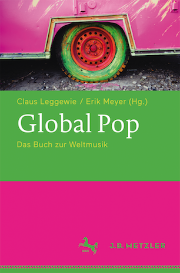Courage to leave a gap
Together with cultural scientist Erik Meyer, political scientist Claus Leggewie has published the volume "Global Pop - Das Buch zur Weltmusik".

At the end of the 1970s, Leggewie lived in Algeria, where he witnessed how raï, the folk and popular music of the Maghreb state, was increasingly flourishing. Both Raï and genres as diverse as Afro-beat and Balkan pop have been subsumed under the term "world music" for decades. In the view of the two editors, this is an outdated term, "a colonial relic". They prefer the term global pop. According to Leggewie and Meyer, it stands for "a collective category of all conceivable styles and regional origins of non-Western, especially non-Western music".
In an interview with WDR, Leggewie said that the book demonstrates "the courage to leave gaps". Indeed, the almost 400-page work is not an encyclopaedia, but a source of reading with over forty contributions from various authors - including Johannes Rühl, artistic director of the international music festival Alpentöne in Altdorf. While the first part of the volume endeavors to explain terms such as folklore, transculturality and world music, the following section offers well-researched but not exhaustive portraits of influential figures such as the ethnomusicologist Brian Shimkovitz, who makes hundreds of African music tapes accessible on his blog, or the US guitarist Ry Cooder. Over the past decades, Cooder has curiously explored different styles such as Tex-Mex, Mali blues and Cuban son, and in 1996, with the album Buena Vista Social Club the rediscovery of forgotten Cuban musicians such as Ibrahim Ferrer.
Chapter three then looks at the market conditions behind the music. In his text "World Music Festivals and the Festivalization of World Music", Klaus Näumann, professor at the Institute for European Ethnomusicology at the University of Cologne, describes how world music events suggest the illusion of global harmony and mutual acceptance. In reality, however, a white, left-leaning middle class celebrates only those things (music, clothing, etc.) that do not run counter to the ideal. In the largest and concluding part Global Pop brief outlines of numerous genres such as Rembetiko, Highlife or J-Pop. These are not intended for specialists in the respective styles, but for the uninitiated and the interested. The book is exemplary, i.e. the focus is entirely at the discretion of the two editors. Accordingly, it would be all too easy to criticize the fact that neither tango nor gamelan - the music ensembles of Indonesia - have found their way into the book. But that is ultimately a minor matter, because: With Global Pop Leggewie and Meyer may not have succeeded in writing the definitive book on the subject, but it is one that arouses curiosity and encourages not only further reading, but also listening to the artists mentioned.
Global Pop - Das Buch zur Weltmusik, edited by Claus Leggewie and Erik Meyer, 392 p., Fr. 31.00, J. B. Metzler, Stuttgart 2017, ISBN 978-3-476-02636-1








